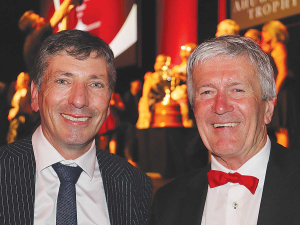NZ Red Meat Outlook 2026: Growth amid trade uncertainty
While things are looking positive for the red meat sector in 2026, volatility in global trade remains a concern, says the Meat Industry Association (MIA).
 Beef + Lamb NZ's Sam McIvor and Agriculture Minister Damien O'Connor at this year's Ahuwhenua Awards ceremony.
Beef + Lamb NZ's Sam McIvor and Agriculture Minister Damien O'Connor at this year's Ahuwhenua Awards ceremony.
A dramatically changing world, in terms of the global economy and consumer preferences, is the focus for a new ten-year Red Meat Sector Strategy.
The strategy is a partnership between the Meat Industry Association and Beef+Lamb NZ and is a revision of the first one, which was unveiled in 2011.
Its vision is growing sustainable value with the outcome being greater profitability, sustainability and resilience across the sector. The new strategy also pushes for increased value for customers and consumers. The other outcomes are for greater social and economic benefits to NZ and a focus on enhancing the integrity and trust of the red meat sector.
According to MIA and Beef+Lamb NZ, the aim is lift innovation and performance, build a platform to create and capture greater value for our products. The industry also wants to stimulate economic growth and employment and establish it as trusted guardians of animals, water and land – as well as enhancing the reputational capital of the red meat sector.
Beef+Lamb NZ chief executive Sam McIvor says the first strategy, produced in 2011, was all about the restructuring of the meat industry and trying to extract better profits along the value chain.
“It was also quite focused on driving the uptake of technology on farm.”
McIvor says in the last seven years there has been a huge shift in the way the entire sector operates with much greater cooperation and a realisation that working together has tangible benefits to all parties. He says a recent example of this was how well the sector handled the Covid lockdown.
Beef+Lamb chair Andrew Morrison says the significance of the sector coming together cannot be underestimated. He says this has led to a range of joint venture initiatives, not the least of which has been Taste Pure Nature – a brand platform to underpin exporters’ marketing programmes and enhance the positioning of New Zealand red meat.
“MIA and Beef+Lamb NZ have been on the Taste Pure Nature journey together and it is working well,” he says.
A word that seems to be centre stage in the primary sector at present is sustainability in all its forms. According to McIvor, a new world is emerging where there is greater knowledge and interest about resources and how these are being used – especially in food production.
“We see that gathering real momentum internationally and if we think about it historically when we used to talk to our foodies, climate change wasn’t a thing they were focused on,” he told Rural News. “But this is something that is changing quite quickly and is a real concern to people.”
However, behind the focus on sustainability is a cost on farm. McIvor points to increasing compliance and regulatory costs all of which affect farm profitability. To that end, he says one of the objectives of the strategy is find a way of paying for these increased costs.
The new strategy for the next five years has a particular emphasis on innovation on farm, as well as processing plants and in products. McIvor says the sector will look at improved market access for our product and how it can be differentiated from our competitors – as well as the obvious focus on sustainability.
“The goal is to extract more value from our businesses to meet the higher cost structure and finding customers internationally that are willing to pay a bit more for our products because of their social attributes,” McIvor adds.
Fruit trader Seeka posted a record profit and returns to shareholders in 2025.
Recent weather events in the Bay of Plenty, Gisborne/Tairawhiti, and Canterbury have been declared a medium-scale adverse event.
DairyNZ's chief executive Campbell Parker says the 2024/25 dairy season reinforces the importance of the dairy sector to New Zealand.
A New Zealand agribusiness helping to turn a long-standing animal welfare and waste issue into a high-value protein stream has won the Australian dairy sector's top innovator award.
OPINION: A bumper season all around.
Dairy Women's Network (DWN) has announced that Taranaki dairy farmer Nicola Bryant will join its Trust Board as an Associate Trustee.

OPINION: A mate of yours truly reckons rural Manawatu families are the latest to suffer under what he calls the…
OPINION: If old Winston Peters thinks building trade relations with new nations, such as India, isn't a necessary investment in…